unit9 health and diseases
英语名校课堂背记本九上7~9单元
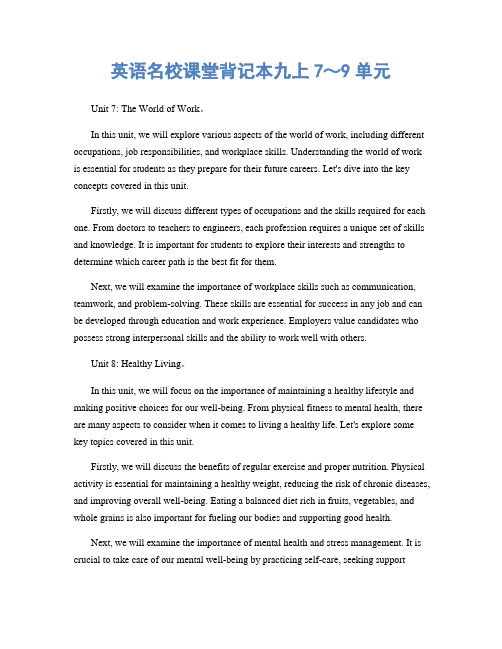
英语名校课堂背记本九上7~9单元Unit 7: The World of Work。
In this unit, we will explore various aspects of the world of work, including different occupations, job responsibilities, and workplace skills. Understanding the world of work is essential for students as they prepare for their future careers. Let's dive into the key concepts covered in this unit.Firstly, we will discuss different types of occupations and the skills required for each one. From doctors to teachers to engineers, each profession requires a unique set of skills and knowledge. It is important for students to explore their interests and strengths to determine which career path is the best fit for them.Next, we will examine the importance of workplace skills such as communication, teamwork, and problem-solving. These skills are essential for success in any job and can be developed through education and work experience. Employers value candidates who possess strong interpersonal skills and the ability to work well with others.Unit 8: Healthy Living。
九年级全册英语重点单词归纳
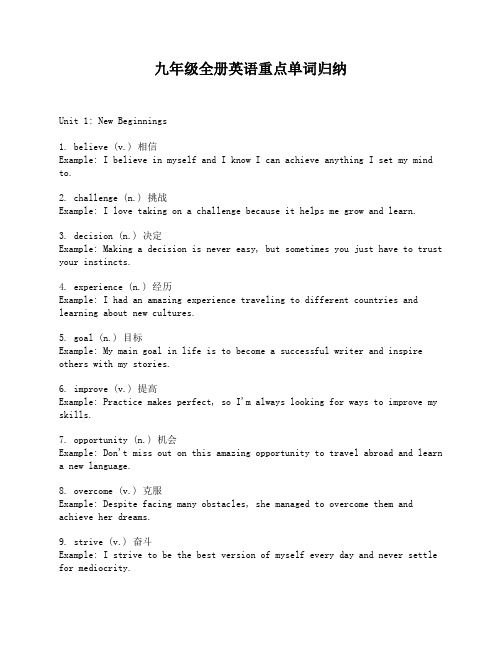
九年级全册英语重点单词归纳Unit 1: New Beginnings1. believe (v.) 相信Example: I believe in myself and I know I can achieve anything I set my mind to.2. challenge (n.) 挑战Example: I love taking on a challenge because it helps me grow and learn.3. decision (n.) 决定Example: Making a decision is never easy, but sometimes you just have to trust your instincts.4. experience (n.) 经历Example: I had an amazing experience traveling to different countries and learning about new cultures.5. goal (n.) 目标Example: My main goal in life is to become a successful writer and inspire others with my stories.6. improve (v.) 提高Example: Practice makes perfect, so I'm always looking for ways to improve my skills.7. opportunity (n.) 机会Example: Don't miss out on this amazing opportunity to travel abroad and learn a new language.8. overcome (v.) 克服Example: Despite facing many obstacles, she managed to overcome them and achieve her dreams.9. strive (v.) 奋斗Example: I strive to be the best version of myself every day and never settle for mediocrity.10. unique (adj.) 独特的Example: Each person has their own unique qualities that make them special and worth knowing.Unit 2: Going Global1. communication (n.) 沟通Example: Good communication skills are essential for building strong relationships.2. global (adj.) 全球的Example: In today's global economy, it's important to have a broad understanding of different cultures.3. impact (n.) 影响Example: His speech had a great impact on the audience and inspired many people.4. opportunity (n.) 机会Example: Studying abroad offers a great opportunity to learn a new language and experience a different culture.5. recognize (v.) 认出Example: I couldn't recognize her at first because she had changed so much over the years.6. society (n.) 社会Example: It is important for individuals to contribute to society and make a positive difference.7. tradition (n.) 传统Example: Every year, we gather together as a family to celebrate our cultural traditions.8. view (n.) 观点Example: Everyone has their own unique point of view, and it's important to respect and listen to others.9. worldwide (adj.) 世界范围的Example: The internet has made it possible for people to connect with others worldwide.10. youth (n.) 青少年Example: The youth of today are the leaders of tomorrow, so it's important to invest in their education and development.Unit 3: Incredible Stories1. adventure (n.) 冒险Example: Going on an adventure allows you to step out of your comfort zone and experience new things.2. ancient (adj.) 古老的Example: The ancient ruins are a testament to the rich history of this country.3. creature (n.) 生物Example: The deep sea is home to many unique and fascinating creatures.4. danger (n.) 危险Example: Climbing Mount Everest is not for the faint of heart, as it is filled with many dangers.5. escape (v.) 逃离Example: The prisoners managed to escape from their cells using a secret tunnel.6. legend (n.) 传说Example: This story has become a legend in our family, passed down from generation to generation.7. treasure (n.) 宝藏Example: Pirates often went on adventures in search of hidden treasures.8. voyage (n.) 航行Example: The explorers embarked on a voyage to discover new lands and trade routes.9. witness (v.) 目击Example: I was a witness to the car accident and had to testify in court.10. mystery (n.) 神秘Example: The disappearance of the missing hiker remains a mystery to this day.Unit 4: Science and Technology1. advance (n.) 进步Example: The latest advance in technology has revolutionized the way we live our lives.2. discover (v.) 发现Example: Scientists discovered a new species of dinosaur in the remote jungle.3. experiment (n.) 实验Example: The chemistry class conducted an experiment to see how different substances react with each other.4. invention (n.) 发明Example: The light bulb is one of Thomas Edison's most famous inventions.5. research (n.) 研究Example: He spent years conducting extensive research on the effects of climate change.6. scientist (n.) 科学家Example: Many great scientists have dedicated their lives to making groundbreaking discoveries.7. technology (n.) 技术Example: The rapid advancement of technology has greatly improved our quality of life.8. theory (n.) 理论Example: Einstein's theory of relativity revolutionized our understanding of space and time.9. universe (n.) 宇宙Example: The universe is vast and full of mysteries waiting to be explored.10. experiment (v.) 实验Example: The students were excited to experiment with different chemicals in the lab.Unit 5: Heroes1. courage (n.) 勇气Example: It takes a lot of courage to stand up for what you believe in, even when faced with opposition.2. hero (n.) 英雄Example: Firefighters are often seen as heroes because they put their lives on the line to save others.3. inspire (v.) 激励Example: Her determination and hard work inspire me to never give up on my dreams.4. sacrifice (n.) 牺牲Example: Soldiers make great sacrifices to protect their country and ensureits safety.5. bravery (n.) 勇敢Example: The young boy showed bravery by confronting the bully and standing up for his classmate.6. legend (n.) 传奇Example: Michael Jordan is a basketball legend who inspired a whole generation of athletes.7. respect (n.) 尊重Example: It's important to treat everyone with respect and kindness, regardless of their background or beliefs.8. selfless (adj.) 无私的Example: Mother Teresa dedicated her life to helping the poor and needy, showing selfless love and compassion.9. admire (v.) 钦佩Example: I admire her for her resilience and determination to overcome any challenges that come her way.10. honor (n.) 荣誉Example: He was awarded a medal of honor for his brave actions during the war.Unit 6: Healthy Living1. diet (n.) 饮食Example: A balanced diet is essential for maintaining good health and preventing diseases.2. exercise (n.) 锻炼Example: Regular exercise can help improve cardiovascular health and strengthen muscles.3. lifestyle (n.) 生活方式Example: Adopting a healthy lifestyle involves making mindful choices about what we eat and how active we are.4. nutrition (n.) 营养Example: The nutritionist advised me to eat a variety of fruits and vegetables to ensure I get all the necessary nutrients.5. physical (adj.) 身体的Example: Regular physical activity is important for maintaining a healthy weight and reducing the risk of chronic diseases.6. sleep (n.) 睡眠Example: Lack of sleep can negatively impact our mood and cognitive functioning.7. stress (n.) 压力Example: Learning effective stress management techniques can help reduce the negative effects of stress on our health.8. wellbeing (n.) 健康Example: Mental and emotional wellbeing are just as important as physical health.9. balance (n.) 平衡Example: Finding a balance between work, social life, and personal time is crucial for overall wellbeing.10. hygiene (n.) 卫生Example: Good personal hygiene, such as regular handwashing, can help prevent the spread of germs and diseases.Unit 7: Nature and the Environment1. conservation (n.) 保护Example: The conservation of natural resources is important for the sustainability of our planet.2. environment (n.) 环境Example: We must take care of our environment and make conscious choices to reduce pollution and waste.3. pollution (n.) 污染Example: Air pollution from factories and vehicles is a major concern forpublic health.4. recycle (v.) 回收利用Example: Recycling paper and plastic helps reduce waste and conserve resources.5. renewable (adj.) 可再生的Example: Solar and wind energy are examples of renewable energy sources.6. species (n.) 物种Example: Many endangered species are at risk of extinction due to loss of habitat.7. deforestation (n.) 森林砍伐Example: Deforestation is causing the loss of biodiversity and contributes to climate change.8. ecosystem (n.) 生态系统Example: A healthy ecosystem relies on the balance between different species and their environment.9. natural (adj.) 自然的Example: National parks are protected areas that preserve the natural beauty and wildlife.10. waste (n.) 浪费Example: The excessive use of plastic contributes to waste and pollution inour environment.Unit 8: Society and Culture1. celebrate (v.) 庆祝Example: We celebrate birthdays to mark the day of our birth and show appreciation for another year of life.2. community (n.) 社区Example: Getting involved in your local community can help build social connections and make a positive impact.3. culture (n.) 文化Example: Each country has its own unique culture, including language, traditions, and customs.4. festival (n.) 节日Example: Chinese New Year is a major festival celebrated by people of Chinese descent all over the world.5. tradition (n.) 传统Example: It is important to preserve and pass on cultural traditions from one generation to the next.6. diversity (n.) 多样性Example: Cultural diversity enriches our society and allows us to learn from one another's experiences and perspectives.7. language (n.) 语言Example: Learning a foreign language opens up opportunities for communication and understanding with people from different cultures.8. society (n.) 社会Example: A just and equitable society is one where everyone has equal rights and opportunities.9. value (n.) 价值观Example: Honesty, respect, and kindness are some of the values that are important in building a strong and supportive community.10. customs (n.) 风俗Example: The customs and rituals surrounding weddings vary greatly across different cultures and religions.Unit 9: Education and Careers1. career (n.) 职业Example: Choosing a career that aligns with your interests and passions can lead to a fulfilling and rewarding life.2. knowledge (n.) 知识Example: Education helps broaden our knowledge and provides us with new opportunities.3. skill (n.) 技能Example: Communication skills and problem-solving skills are highly valued in the workplace.4. graduate (n.) 毕业生Example: After years of hard work, I am proud to say that I am a high school graduate.5. profession (n.) 职业Example: Teachers, doctors, and lawyers are examples of professions that require specialized training and education.6. opportunity (n.) 机会Example: Education opens doors to new opportunities and helps build a better future.7. achieve (v.) 实现Example: With hard work and dedication, you can achieve anything you set your mind to.8. success (n.) 成功Example: Success means different things to different people; it could be achieving personal goals or making a positive impact on others.9. university (n.) 大学Example: Many students aspire to attend a prestigious university to further their education and expand their horizons.10. scholarship (n.) 奖学金Example: She was awarded a scholarship for her outstanding academic achievements.。
英语基础模块上册unit9cultivation
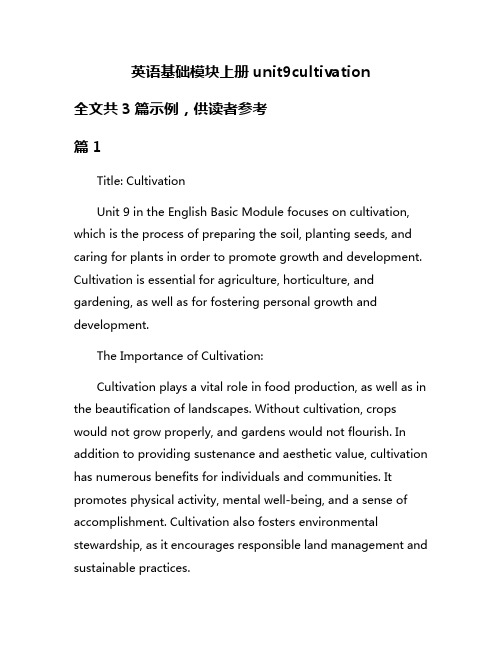
英语基础模块上册unit9cultivation全文共3篇示例,供读者参考篇1Title: CultivationUnit 9 in the English Basic Module focuses on cultivation, which is the process of preparing the soil, planting seeds, and caring for plants in order to promote growth and development. Cultivation is essential for agriculture, horticulture, and gardening, as well as for fostering personal growth and development.The Importance of Cultivation:Cultivation plays a vital role in food production, as well as in the beautification of landscapes. Without cultivation, crops would not grow properly, and gardens would not flourish. In addition to providing sustenance and aesthetic value, cultivation has numerous benefits for individuals and communities. It promotes physical activity, mental well-being, and a sense of accomplishment. Cultivation also fosters environmental stewardship, as it encourages responsible land management and sustainable practices.The Process of Cultivation:The process of cultivation involves several key steps, including preparing the soil, selecting seeds or plants, planting them, watering and feeding them, and protecting them from pests and diseases. Each step is important for ensuring the success of the cultivation process. Proper soil preparation, for example, helps plants establish strong roots, while regular watering and feeding supply them with essential nutrients. Pesticides and fungicides can be used to control pests and diseases that may threaten the health of plants.Cultivating Personal Growth:Cultivation is not only important for plants but also for individuals. Cultivating personal growth involves nurturing one's talents, skills, and potential in order to reach one's full potential. This process requires dedication, patience, and hard work, just like cultivating plants. By setting goals, developing new habits, and seeking out opportunities for growth, individuals can cultivate their personal development and achieve success in various areas of their lives.Cultivation in Education:Cultivation is also a key concept in education, where it refers to the process of nurturing students' intellect, skills, and character. Educators cultivate their students by providing them with the knowledge, resources, and support they need to succeed. By creating a positive learning environment, setting high expectations, and fostering a growth mindset, teachers can cultivate their students' academic and personal growth. Cultivation in education also involves promoting moral values, social skills, and emotional intelligence in students.In conclusion, cultivation is a fundamental process that plays a crucial role in agriculture, horticulture, gardening, and personal development. By understanding the importance of cultivation, mastering the process, and applying it to various aspects of life, individuals can grow and thrive in both their personal and professional endeavors. Cultivation is a journey of growth, transformation, and self-discovery that requires patience, dedication, and resilience. As we cultivate our gardens and ourselves, we become more connected to nature, to others, and to ourselves. Let us embrace the process of cultivation as a pathway to growth, fulfillment, and success.篇2Unit 9 CultivationIn Unit 9 of the English basic module, students will learn about cultivation, which is the process of preparing and tending to the soil in order to grow crops or plants. Cultivation is an essential part of agriculture and is crucial for providing food for the world's population. In this unit, students will learn about different cultivation techniques, tools, and practices.1. Types of Cultivation:- Traditional Cultivation: This method involves manually preparing the soil using tools such as hoes and shovels. Traditional cultivation is labor-intensive but is still widely practiced in many developing countries.- Mechanized Cultivation: This method uses machines such as tractors and plows to prepare the soil. Mechanized cultivation is more efficient and allows for larger areas of land to be cultivated in a shorter amount of time.- Organic Cultivation: This method involves growing crops without the use of synthetic chemicals or pesticides. Organic cultivation is becoming increasingly popular due to its environmental benefits and health benefits for consumers.2. Cultivation Tools:- Plow: A plow is a farming tool used to break up and turn over soil in preparation for planting. There are different types of plows, including the moldboard plow and the disc plow.- Hoe: A hoe is a gardening tool used to remove weeds and cultivate the soil. There are different types of hoes, including the Dutch hoe and the draw hoe.- Tractor: A tractor is a farming vehicle used to pull heavy machinery such as plows and seeders. Tractors are essential for mechanized cultivation.3. Cultivation Practices:- Crop Rotation: Crop rotation is the practice of planting different crops in the same field in succession. This helps to maintain soil fertility and prevent soil erosion.- Mulching: Mulching is the practice of covering the soil with materials such as straw or bark to retain moisture and suppress weeds. Mulching also helps to improve soil structure.- Irrigation: Irrigation is the process of supplying water to crops to ensure proper growth and yield. There are different irrigation methods, including drip irrigation and sprinkler irrigation.In conclusion, cultivation is a fundamental aspect of agriculture and plays a crucial role in feeding the world's population. By learning about different cultivation techniques, tools, and practices in Unit 9, students will gain a deeper understanding of how food is produced and the importance of sustainable farming practices.篇3Unit 9 Cultivation in the Basic English module focuses on various aspects of cultivation, including agriculture, gardening, and the development of skills and knowledge. In this unit, students will learn key vocabulary related to cultivation, practice their listening and speaking skills through discussions androle-plays, and engage in reading and writing activities to deepen their understanding of the topic.One of the key topics covered in this unit is agriculture. Agriculture is the practice of cultivating crops and raising animals for food, fiber, and other products. Students will learn about different types of agriculture, such as subsistence farming, commercial farming, and organic farming. They will also learn about the importance of sustainable agriculture practices in preserving the environment and ensuring food security for future generations.Another important topic covered in this unit is gardening. Gardening is the practice of cultivating plants, such as flowers, fruits, vegetables, and herbs, for aesthetic purposes or for consumption. Students will learn about the tools and techniques used in gardening, as well as the different types of gardens, such as flower gardens, vegetable gardens, and herb gardens. They will also learn about the benefits of gardening, such as physical exercise, stress relief, and connecting with nature.In addition to agriculture and gardening, students will also explore the development of skills and knowledge related to cultivation. This includes learning about the history of agriculture, the science of plant growth, and the role of technology in modern farming practices. Students will also learn about the importance of lifelong learning and continuous improvement in cultivating their skills and knowledge in this field.Overall, Unit 9 Cultivation in the Basic English module is designed to help students develop a deeper understanding of the practices, principles, and benefits of cultivation. By learning about agriculture, gardening, and the development of skills and knowledge in this field, students will be better equipped to engage with the world around them and make informed decisions about their own cultivation practices.。
高中英语Unit9HumanBiologyPeriod2Lesson1课件北师大版选择性必修第三册
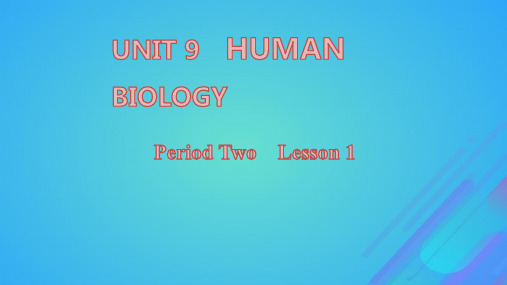
⑧The boy pretended to have known it.
1.以上句子分别使用了不同的________或________形式 来表达“完成”的概念。
2.根据以上例句,表示“完成”动作的形式有: ________时态(句①), ______时态(句②和句③),过去完成进行 时态(句⑥), ______时态(句④), ______的完成式(句⑧),动词ing形式的完成式(句⑤),含有情态动词的完成时态(句⑦)。
灵长类动物的成功克隆获得了全世界的赞誉,被认为是一 项巨大的突破,从而为治愈多种疾病、延缓衰老提供线索。
【答案】3.led to; how to prevent
4.For years, there had been ________ animals artificially. 多年来,人们一直在尝试人工克隆动物。 5.At first, Dolly grew normally, but later she ________ that is more normally found in much older animals. 起初,多莉发育正常,但后来患上了一种疾病,这种疾病 更常见于衰老的动物。 【答案】4.attempts to clone 5.developed an illness
things and discover the differences between them.
ห้องสมุดไป่ตู้
()
5.If you say that something will happen or continue forever,
高中英语Unit9HumanBiologyPeriod6Viewing课件北师大版选择性必修第三册
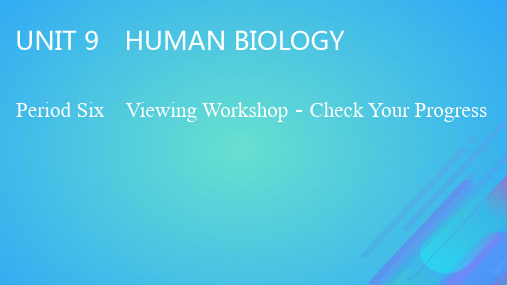
perform an experiment/an operation/a miracle做实验/做手术/ 创造奇迹
It’s extremely cruel to perform an experiment on live animals. 对动物活体进行实验是一件极其残忍的事情。
performance n. 表演;表现 put on/give a performance进行表演 Tom used to be very shy, but this time he was brave enough to give a performance in front of a large audience. 汤姆过去很腼腆,但这次却非常勇敢能在大庭广众面前上 台表演。 performer n. 表演者;执行者
4.perform vt. &vi. 表演;表现;执行 (P65)Qi, a vital energy that flows through the body, performs multiple functions in maintaining health. 【翻译】气是流经身体的一种重要的能量,在维持健康方 面起着多种作用。
(3)He said this would prevent companies from ________ (create) new jobs.
(4)We hope to keep anything unpleasant ________ happening. 【答案】(3)creating (4)from
【语言提升】 prevention n. 阻止;预防 Stores spend more and more on crime prevention every year. 商店每年在防止犯罪方面的花费越来越多。
Ambition研究生综合英语unit 9 PPT

Unit Nine AmbitionI. Introduction of the authorPerri Klass, MD, is a pediatrician and writer, who has published extensively about her medical training and pediatric practice. She is well known for her writing about the issues of women in medicine, about relationships between doctors and patients, and about children and literacy. She is the author of both fiction and nonfiction: novels, stories, essays, and journalism.Dr. Klass is Professor of Journalism and Pediatrics at New York University, and Medical Director of Reach Out and Read, a national childhood literacy program that works through doctors and nurses to encourage parents to read aloud to young children, and to give them the books they need to do it.She is a member of the National Advisory Council of the National Institute of Child Health and Human Development, and has been nominated by the President of the United States to the Advisory Board of the National Institute For Literacy.Baruch de SpinozaBaruch de Spinoza was a Jewish-Dutch philosopher. Revealing considerable scientific aptitude, the br eadth and importance of Spinoza’s work was not fully realized until years after his death. By laying the groundwork for the 18th century and modern biblical criticism, he came to be considered one of the great rationalists of 17th-century philosophy. His magnum opus, the posthumous Ethics, in which he opposed Descartes’s mind–body dualism, has earned him recognition as one of Western philosophy’s most important contributors. In the Ethics, ―Spinoza wrote the last indisputable Latin masterpiece, and one in which the refined conceptions of medieval philosophy are finally turned against the mselves and destroyed entirely.‖Philosopher Georg Wilhelm Friedrich Hegel said of all contemporary philosophers, ―You are either a Spinozi st or not a philosopher at all.‖Jane Goodall is a British primatologist, ethologist, anthropologist, and UN Messenger of Peace. Considered to be the world's foremost expert on chimpanzees, Goodall is best known for her 45-year study of social and familyinteractions of wild chimpanzees in Gombe Stream National Park, Tanzania. She is the founder of the Jane Goodall Institute and has worked extensively on conservation and animal welfare issues.II. The theme of the textDr. Klass discusses he r understanding of ambition and its meaning to one’s life. According to her, ambition is dreaming big dreams with no restrictions on one’s expectations. Ambition may make one frustrated or even one-sided, but it can also drive you to get close to your drea m which deserves to be cherished in one’s life.III. Structure of the textPart I Introduction (Para. 1-3)Main idea: I appreciate ambitious people since they have grandiose dreams and are entertaining and interesting to talk to. I am also an ambitiouspeople and do not feel apologetic about it.Part II Main body (Para. 4-14)∙Main idea: To some people, the word ―ambition‖ often relates with the words ―madness‖ and ―ruthless‖. However, in the late 70s and 80s, ―ambition‖ became desirable. But for me, ambitions are not some specific and attainable goals but big dreams. It is quite important but also difficult for one to live with his or her ambition.Argument 1 (para. 4-7)∙ Observing from a historical perspective, ambition has been a pejorative word. However, the author has her own understanding on this word.Example 1: the word ―ambitious‖ linked to a ―career woman‖ who is ruthless.Example 2: ―ambitious‖ is still a nasty attribute even it is favored by the ones who want to be successful.Argument 2 (para. 8-13)∙ People with or without ambition are tortured by ambition.Example 1: Achievements made by ambitious people will give you a great pressure.Example 2: One has to suffer a long time tough work to enjoy their delayed gratification.Example 3: One’s ambitions may come into conflict so one has to give up some of them.Part III Conclusion (Para 14-15)∙ Main idea: Although people are often over consumed by their ambitions, it is still necessary to cherish their own dreams which can drive you move forward.IV. Words and phrases1. grandiose: impressive because of unnecessary largeness or grandeur1) The sad truth is that not one of Tim's grandiose plans has even begun.2) Today it is the wealthiest enclave in the country, with gaudy, grandiosemansions that cost hundreds of thousands of dollars.如今它是这个国家最富裕的地区,拥有价值数十万美元,华丽而宏伟的高楼大宅。
Unit 9Read and write.1 Fill in
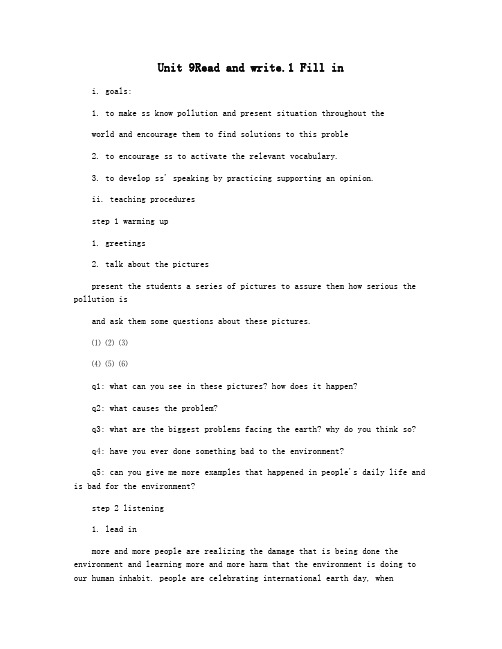
Unit 9Read and write.1 Fill ini. goals:1. to make ss know pollution and present situation throughout theworld and encourage them to find solutions to this proble2. to encourage ss to activate the relevant vocabulary.3. to develop ss' speaking by practicing supporting an opinion.ii. teaching proceduresstep 1 warming up1. greetings2. talk about the picturespresent the students a series of pictures to assure them how serious the pollution isand ask them some questions about these pictures.⑴ ⑵ ⑶⑷ ⑸ ⑹q1: what can you see in these pictures? how does it happen?q2: what causes the problem?q3: what are the biggest problems facing the earth? why do you think so?q4: have you ever done something bad to the environment?q5: can you give me more examples that happened in people's daily life and is bad for the environment?step 2 listening1. lead inmore and more people are realizing the damage that is being done the environment and learning more and more harm that the environment is doing to our human inhabit. people are celebrating international earth day, whenvarieties of activities are held so that more people will be involved in environment protection.2. while-listeninglisten to part 1 and answer the questions.1) why is she giving this speech?2) what does she think the most serious problem is?3) what does she say that we should do about it?4) what do you think she will say next?listen to part 2 and fill in the blanks with what ss hear.argument 1: we should _____________.we must _________________________.we should _______________________.if we _______, we ________________. argument 2; _______________________problem: _______________________solutions: _______________________3. post-listeningpair work: infer what the speaker will say next, list like the above one and share the speech with the partner and the class.group work: discuss with group members about the measures that we may take to protect air, forest; animals; grassland.ask ss to deliver their speech on environment protection.period 2 speakinggoals:1. make the ss learn some useful words and expressions.2. further develop students’ speaking abilities.3. arouse the ss to take better care of the earth.teaching procedures:step 1 revisionwe have known much about pollution around. what are the problems we are facing? which one do you think is the most important? why?group 1: the lack of safe and clean water.more than 1.2 billion people lack access to clean and safe waterproviding safe and clean drinking water would save money by freeing hospital beds from patients with disease caused by dirty water.12 percent of the world’s population uses 85 percent of its water, and these 12percent live in developed countries.group 2: air pollutionair pollution causes more than 2.7 million deaths in the world every year.most air pollution is caused by the burning of fuels like coal, gas and oil.each year tens of thousands of people die as a result of breathingpolluted air.air pollution causes other diseases and may make it easier for children to get sick in the future.group 3: poor sanitationover 2.4 billion people have no access to sanitation.every day, as many as half of all the people on the earth suffer from one of the many diseases caused by poor sanitation.without proper sanitation, efforts to improve health care are useless.group 4: povertyhalf the world lives on less than two dollars a day.1.3 billion peoplelive on less than one dollar a day.in the year , some 1.7 million children died as a result of poverty.almost million people on the world do not have enough to eat.step 2 speaking1. talking about what ss can see in the picture.(1) (2)q1: what is being piled in the picture 1?q2: what can coal be used for?q3: what is being giving off from the workshop?q4: what is being polluted?every coin has two sides. it is true with coal, which is a valuable resource that can be used to produce energy, but it can also cause serious pollution.2. group work: a debate coal is/isn’t a valuable resource.pros consa businessman an environmentalista scientist a local citizena local leader… …1. as we know, coal is a valuable resource to produce energy, but it can also cause serious pollution. we will attend a meeting and discuss the issue.2. four ss get a group. you are citizen, businessman, scientist and environmentalist.citizen: we must burn the coal so that we can get money to develop our area as soon as possible, because…businessman: we should burn the coal because…scientist: we should spend more money on science so that we can use the coal in a better way, because…environmentalist: we shouldn’t burn the coal because…3. as a local leader in this area, summarize and help the speakers decide.4. ask the ss use these useful expressions:we must make sure that… it’s clear that…i believe that we must… i’m all for…if nothing is done…, then… i can’t imagine that…sure/ certainly / absolutely it would be better if we…is there a better way to…?step 3 conclusionwe human beings should take good care of our planet, because it is the only place we can survive. love the earth, love ourselves.period 3-4 reading welcome to the earth summiti. goals:1.to promote the students' understanding of the text2. to get the students to grasp the detailed information of the text3. to enable the students to master some words and expressions4. to improve the students' reading abilityii. teaching proceduresstep 1 warming upask the students some questions connected with pollutionq1: did you use to go swimming in a river when you were young?what about the children today? why not?q2: do you use one-off chopsticks while having fast food?q3: how do you deal with the plastic bags?q4: what do you think of the air today?q5: what do you think of the relationship between economy development andpollution?step 2 pre-reading1. discussionread the title and discuss in pairs what problems will be discussed at the summit.(as the title states, problems related to the earth will be discussed at the summit, like air, water, forest, desert, grassland, etc)2. predictiongroup work: fill in the chart with what ss predict about what each part of the text will be about.introductionbodyconclusion3. problem-solvinggo through the whole passage and compare whose guess is the closest to the content of the passage.4. find the answers to these two questions.q1: when and where was the earth summit held?(in in johannesburg in south africa.)q2: which chinese officer attended the meeting? what did he say?(premier zhu rongji; stressed the need for quality and fairness in the world. )step 3 while-reading1. individual workget the students to read the text carefully and ask some students to answer the following questions in their own words.q1: what was the meeting held in about ?q2: what's the main theme of the earth summit?q3: do you know the 'big three’? what are they?q4: where do you think usually has 'the big three'? why?q5: what does global development mean nowadays? what should developedcountries actually do?q6: what's the use of conferences like the earth summit?q7: what's the key to the future? as a student, what should you do?2. reading for informationwhen inwhere johannesburg, south africatheme sustainable developmenthow to continue developing the world without damaging the environmentbodythe “big three” contaminated drinking water; 20%poor sanitation:air pollution: three million deaths; in rural areas in developing countriesglobal development equality each country takes part infairnessinternational cooperation rich counties help poor countries; prosperity of developing countries; possible sustainable developmentconclusionimpact 1. help to understand the existing serious problems2. there’s still time to ta ke action3. change the way we live to save the earth4. ss are learning “earth issues”5. a place to find solutions for the futurestep 4 post-reading1. retellingsuppose you were the chinese girl who attended the earth summit, tell what she heard and saw at the summit. begin with “hello, everyone. i’m theluckiest girl to attend the earth summit in johannesburg. now let me tell you about the summit. …”2. interviewss work in pairs, playing the role of a newspaper reporter, attendantsfrom different continents attending the earth summit. finally the teacherinvites some pairs to act out their interviewgroup work:task: prepare the coming earth summitarrangement: s1: organizations2: prepare necessities for the summits3: mess medias4: attendants inviteds5: budgets6: transportation & accommodationhave ss present the preparations for the summit in groups.task debateas we know the earth summit is a place to find solutions for the future. some people say that money can solve all problems, but some say knowledge. which one do you agree? money or knowledge? ss will be divided into two groups. see which group can win the debate.step 5 conclusionif we want to get knowledge, we must have better education. with better education, people will be able to build a better society in harmony withnature. with better education, much of the poverty can be wiped out. withbetter education, we will see less violence and fewer wars.step 6 homework1. write a report about the earth summit. (- words)2. make up a poster to arouse people to stop polluting the environment.period 5-6 language study & grammari. goals:1. to get ss to learn and master the usages of the new words and theuseful expressions in this unit.2. to enable ss to grasp the grammar: inversion.ii. teaching procedures:step 1 warming up1. greetings2. play a guessing game: first some items are shown on the screen, andeach item is the paraphrase of one new word. divide the class into four groups. ss are encouraged to guess the word as quickly as possible. this game is to enlarge ss’ vocabulary.(1) to make a place or substance dirty and dangerous by adding sth to it.(2) to make a short statement giving only the main information and not the details of a plan, report etc.(3) the situation or experience of being poor.(4) a position or situation in which people have the same rights, advantages.(5) to do sth in order to protect someone or sth from being attacked(6) to do sth that produces an effect or change in someone or sth(7) .behavior that is intended to hurt other people physically(8).not right or fair(9).sth that you can choose to do or use instead of sth else(contaminate, summarize, poverty, equality, defend, affect;violence, unfair, alternative )complete the following sentences with the words from the bracket, using the correct for1. according to the report, the environment has become a major _______ worldwide.one in five children before age five die from diseases caused by environmentalproblems. ( kill )2. internet use has been spreading at a(n) _________ speed in china. “have you surfed the net?’’ has become a more common greeting than the traditional “ have you eaten?’’ ( alarm )3. the word “netizen”, which means a p erson who uses the internet, comes from “net” and “________”. ( city )4. during the interview, the young man asked about the job ____________ asa sales manager. ( responsible)5. how many chinese ______________ will be sent to the international meeting in stockholm, sweden? ( represent )6. the people who listened to the report were shocked by the ________ of the villagers. ( suffer )7. it was there people’s __________ to work hard and well that impressed me most. ( willing )(killer, alarming, citizen, responsibility, representatives, suffering, willingness )step 2 language points and useful expressions1. attend: 出席,上(大学等),照料to go to an event such as a meetingeg: only 7 people attended the meeting.to go regularly to a school, church etceg: all children between the ages of 5 and 16 must attend school.to look after someone, especially because they are illeg: the nurse attended the patient daily.attend to sb/sth 处理,照应eg: i may be late �c i have got one or two things to attend to.are you being attended to in a shop?then do some exercises to enable ss to distinguish the following words: attend / join / join in / take part in / join sb in sthex: fill in the blanks with the expressions given.1. he’ll _________ an important meeting tomorrow.2. almost all the teams in our school __________ the basketball match.3. my wish is to ________ the army after graduation.4. we’ll _______________ social activitie s during the summer vacation.5. they didn’t ___________ the wedding.6. i ________ the party last year.7. our headmaster will _______ us ____ the discussion this afternoon. (attend, join in, join, take part in, attend, joined, join in )2. take notes: 作笔记,记录take action: 采取行动eg: do you takes notes of the lectures?he sat quietly in the corner taking notes carefully.they took action to stop hithe police took action to deal with this thing immediately.the medicine will not take action for several hours.已经开始起至促进作用,起效,生效the pill takes effect as soon as you swallow it.take turnstake measures/stepstake placetake caretake medicinetake timetake coldtake noticetake sideseg: you always takes sides with him without even listening to me.3. content:1). n. 内容,目录 (常作 ~ s ) ; 容量,容积eg: the contents of a booka table of contentslook up the contents at the beginning of the book.a bucket of more than usual content2). adj. 满足用户的,令人满意的be content to do sthbe content with sthcontent oneself with sthhe is quite content to watch tv for hours.i’m very content with my life at present.as there’s no butter we must content ourselves with dry bread. access: 进入,接近eg: the dead-end street was the only access to her home.access to the mountain-town is often difficult because of the bad roads.have access to :eg: twenty percent of the people on earth do not have access to clean drinking water.have sth that you can useeg: the public don’t have access to the site.not until we know more will we be able to improve the situation.until 的三种句式i didn’t go to bed until my mother came back. (陈述句) vnot until my mother came back did i go to bed. (倒装句)it was not until my mother came back that i went to bed. (特别强调句)直至她母亲把一切对杰克和盘托出,杰克才明白她为什么跟自己生气。
北师大版高中英语选择性必修三Unit9Lesson1To Clone or not to Clone
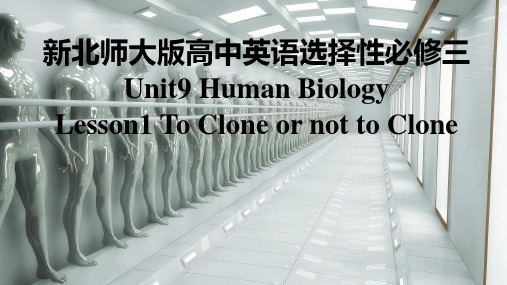
Intensive Reading
1. What was the first cloned mammal? What happened to her?
It was a sheep named Dolly in 1996.
At first, Dolly grew normally. But later she developed an illness that is more normally found in much older animals. She lived for six and a half years, only half the life of the sheep from which she was cloned.
Summary
Complete the summary using the information in the article.
Natural cloning has taken place for generations. An example of this is identical 1 __tw__in_s___. A sheep called Dolly was the first mammal to be cloned 2 _a_r_t_if_i_c_ia_l_ly_. Since Dolly, more than 20 mammal 3 __sp_e_c_i_e_s___ have been cloned including camels and goats. In 2018, China announced that two monkeys had been cloned.
Intensive Reading 2. How has the science of cloning developed since the first cloned mammal?
- 1、下载文档前请自行甄别文档内容的完整性,平台不提供额外的编辑、内容补充、找答案等附加服务。
- 2、"仅部分预览"的文档,不可在线预览部分如存在完整性等问题,可反馈申请退款(可完整预览的文档不适用该条件!)。
- 3、如文档侵犯您的权益,请联系客服反馈,我们会尽快为您处理(人工客服工作时间:9:00-18:30)。
Reading
Health Care and Epidemics
卫生保健与流行病
Fast reading: Fill the right order before the main idea of each paragraph.
(3 ) People are very afraid of epidemics. (2 ) Epidemics affect deeply.
Drivers refuse to drive them
Headaches Running noses
A fever I have the flu. pregnant women , people over 65,patients.
Part2(2-4):Three kinds of epidemics: (Black Death, plague, flu )
3. The plague destroyed once-prosperous cities, left villages vacant, and caused great disasters.(T)
4. People in power have been known to be cruel to victims of diseases.(T) 5. All flu patients have a high body temperature, called a fever.(F)
(4 ) Flu is a non-fatal disease. (1 ) Outbreaks of infectious diseases are epidemics.
(5 )Medicine relieves flu symptoms. (7 )Government should provide preventive health care.
Epidemics
Reshape , affect , change. Black death
The most widely known
Destroy, leave ,cause.
25-50 percent
cruel
fear
plague Bosses fire them
Landlords throw them
Paragraph2-4 True or false:
1. Epidemics can’t change the balance of power among different groups of people.(F) 2. The Black Death broke out in Europe in 1347.( T)
suffer from disease
have no good health care
no treatment
no money
no doctor
In large population centers
epideLeabharlann icsPart1:Having no good health care leads to epidemics.
Paragraph5-7
How many ways can deal with the epidemics in the text?
medicine
vaccination
four
good health habits
preventive health care
1.Can medicine cure the flu? No Yes 2.Does medicine relieve flu symptoms? 3.Can vaccination prevent all diseases? No 4.How do we get vaccine? Inject ,take Yes 5.Can good health habits prevent diseases? 6.Is it illogical to spend more on treatment of diseases than preventing them? Yes 7.Has the government taken measures to provide preventive health care? Yes
Sum up
Part1:Having no good health care leads to epidemics. Part2(2-4):Three kinds of epidemics: (Black Death, plague, flu )
Part3(5-7):The ways to deal with the epidemics.
Extend
Keep good habits to prevent flu.
Homework
List the details to keep healthy and do them on time every day.
Thank you
Unit 9 Health and Diseases
Warming up
Have
you paid enough attention to your health? No, I haven’t. you often read about health issues? Yes, I do.
Do
(6 )Some diseases can be prevented by vaccination.
Careful reading
Read
the text carefully and grasp the useful information in each paragraph.
Paragraph 1
